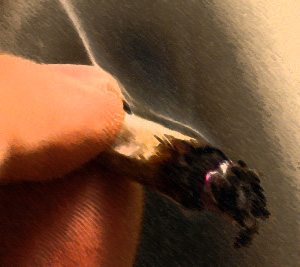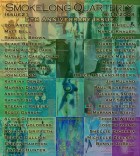Your main character is driven to have a baby, to the point of engaging in self-destructive behavior. But her drive leads her to her goal. Do people with this extreme motivation achieve more than those with moderate temperaments? Are there consequences? (Is this question presumptuous?)
In my opinion, yes, these people do achieve more. In this story, which is a flash version of a novel, the heroine opens herself out to many possibilities and this leads her to all sorts of people and situations which she may never have encountered if she had not taken risks, had not been so determined in her goal. Of course, there are consequences to this, the world in which she enters in Italy is not always a pretty one: it leads her to people who are lonely, reckless. It forces her into a darker world than the one she’s used to, and therefore the choices which seemed quite obvious inside her safer world, are no longer so clear.
This was a turning point for me: “The sex with the random American became more frequent, he had a personality, which surprised me, and a past…”
Hari’s opinion of men is very limiting. She considers them simply to be tools in her need for a baby. She has no respect for them, doesn’t really consider them to be utterly human, which is why when she starts to become interested in the ‘random American’ who she’s sleeping with, it shocks her. The fact that he can have opinions and a history and feelings, is not something she has associated with men before, especially not the kind of guys she sleeps with, adulterers and one-night stand merchants. We are then taken, for a moment, into his story, into his past, and the focus lifts slightly from being all about her. This is a big part of the bigger story, and how her own selfish, reckless, determination unwittingly leads her into other people’s story, other people’s lives.
This story affected me. I found the character’s actions shocking and troublesome. Yet, I was happy for her when the nun handed her the baby, and found the moment just right. How did you intend for the reader to feel about this character and her story?
I’m not sure I ever have the audience’s perspective clearly in my mind as I write. When I rewrite, I cut heavily, which is an integral part of the short story form, particularly for flash. I do often think what despicable characters I create, and there’s a certain amount of humour in this for me, as there often is in villains. Morally questionable characters are often, as you noted earlier, very strong, dominant, driven characters, and I think there’s an interest for a reader in these kinds of characters, as they allow an insight into worlds that perhaps a more timid, kinder person would avoid. What’s important about this character, however, is that she’s a young woman. Our expectations of women are very different to those of men. We expect a certain level of integrity from a young woman, especially with regards to relationships, love and babies. Hari acts like a young man in the way she uses men, in the way she comes close to despising the men she sleeps with, in how dismissive she is to any of their needs or issues. And she takes. I think this presumption of taking, with a complete disregard of whether it might be fair or right, is something which is still very taboo within our understanding of what it means to be female. Why should she presume to take exactly what she wants? Of course, she doesn’t exactly get what she wants, or certainly not the way she planned it. This isn’t her biological child, but a child left by a very desperate woman in a very different set of circumstances. Again, this moment links Hari with something bigger, with womankind, with Catholicism, with hypocrisy. And perhaps at the end of the story the reader is unsure as to how long Hari will be able to have this baby as hers, perhaps that could incite some kind of sympathy in the reader towards her, I don’t know. Just a note to say that while this story is fiction, The Baby Drop-Off itself does exist.
Tell us about the novel you wrote.
I wrote the novel in the city where “The Baby Drop-Off” is set, though this novel was set in the city I’m living now. It’s a novel, but I wrote it as a series of twenty self-contained short stories from different narrative perspectives which follow the same narrative thread. It’s about an adulterous love affair, and is set in a very small, stifling world of Brighton. It juxtaposes, in the two protagonists, Isabella and Adam, this idea of people who take risks, and those who, at the last moment, stay in what they know, however much they despise that world. Isabella believes that she escapes the silent suffocation of her marriage through her love affair with Adam, but what she really enters into is a narrative of Adam’s lies which he creates to keep both Isabella and his fragile wife Helen safely inside his world. There’s a high sense of disappointment in love in this novel, it may even be anti-romantic, and explores our sense of expectations in both romance and romantic fiction. It’s also about the English condition (particularly in males), a lack of ambition, a slow, passionless death of the spirit, brought about by my culture, and of course, the reluctance towards change.
This issue marks SmokeLong‘s fifth anniversary, which has me thinking about longevity and growth. There’s no denying the literary arena is a fickle one, with journals coming and going, writers shooting onto the scene then falling into a long hiatus, editors changing houses, agents merging, and the trends! Don’t even get me started! How do you, as a writer, endure the ups and downs? Have you experienced any setbacks? What measures have you taken to grow?
I was thinking about this just the other day, and trends in what kind of books are being published right now, and whether they will be studied in years to come. I don’t know the answer really to either my question or to yours, but there’s always a struggle in writers to want to write something which they believe in, rather than that which will just sell, but we need to make a living as well. I love the short story form. It’s a different medium, really than the novel, but in Britain, they just don’t get published. In America short stories and flash fiction, at least, have some standing. I am currently adapting a very short story of mine at the moment into the length of a novel, because this is what agents have asked of me. I’d like to see short story collections by unknown writers published, I’d like to see more short fiction and flash fiction journals being read and bought, I’d like to see a revival of the serialised novel.
In terms of my own growth as a writer, the short story form has taught me about revision. It’s changed my writing dramatically; I’m like a convert to the form. I write now, in one go, then I cut and cut my work for hours. I used to spend time justifying why I needed all the detail, all the back story, I save several versions of my prose, and reading it over again the shorter version is always the best one. It’s so precise. And it leaves gaps of wondering. There’s a story in not knowing everything, it opens a world, an idea, a character out to the reader and creates a space for them, without telling them the space. It opens things out, I guess in the same way that reckless characters do. And I like that.



 A SmokeLong Summer 24!
A SmokeLong Summer 24!